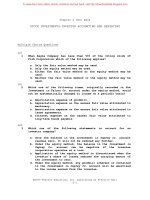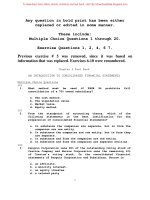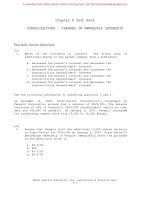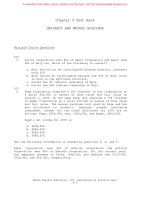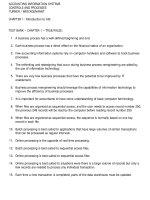Test bank strategic staffing 2e by philips gully chapter 02
Bạn đang xem bản rút gọn của tài liệu. Xem và tải ngay bản đầy đủ của tài liệu tại đây (115.73 KB, 9 trang )
Strategic Staffing, 2e (Phillips/Gully)
Chapter 2 Business and Staffing Strategies
1) Most companies can easily replicate a competitor's capabilities by imitating the competitor's
staffing practices.
Answer: FALSE
2) Companies that use the same recruiting techniques are likely to experience similar results.
Answer: FALSE
3) A company pursuing a low-cost strategy is least likely to embrace an asset-based philosophy.
Answer: FALSE
4) Innovative organizations that rely on new product development and organizational flexibility
require employees with a narrower range of aptitudes and abilities, while organizations in
narrow, relatively stable markets rely on a low-cost strategy.
Answer: FALSE
5) If a company has high turnover, it should focus on filling vacancies quickly and hiring people
who can hit the ground running.
Answer: TRUE
6) Viewing employees as an asset to be managed generally leads to a low-cost approach to
staffing.
Answer: TRUE
7) Valuing the ideas and contributions of people with diverse ideas and perspectives is a possible
component of a company's talent philosophy.
Answer: TRUE
8) When business slows down, flexible workers are dismissed before core workers.
Answer: TRUE
9) An internal talent focus requires a firm to invest in employee training and development.
Answer: TRUE
10) Organizations prefer to hire internally to enhance employee motivation and retention levels.
Answer: TRUE
11) External hiring reduces organizational diversity.
Answer: FALSE
12) Proactive staffing is done in response to situations or issues.
Answer: FALSE
1
Copyright © 2012 Pearson Education, Inc. Publishing as Prentice Hall
13) An organization evaluating its staffing practices in response to a hiring discrimination
lawsuit is an example of proactive staffing.
Answer: FALSE
14) When labor markets are tight and good recruits are hard to find, organizations must pursue
talent-oriented staffing.
Answer: TRUE
15) A staffing function is centralized when an organization that has multiple business units has
one staffing unit that is responsible for meeting at least some of the needs of all of the company's
business units.
Answer: TRUE
16) According to the resource-based view of the firm, in order to create value, staffing practices
must ________.
A) imitate the practices followed by competitors
B) enhance the differentiation of the firm's products
C) rapidly create new products or services
D) maximize the number of applicants who are hired
Answer: B
17) Which of the following, if true, would uphold a company's sustainable competitive
advantage in front of rival firms?
A) Workforce attributes encouraged by staffing practices are commonplace.
B) It is difficult to imitate the strategic staffing practices of the firm.
C) Staffing practices have maximum substitutability.
D) The firm should take care not to exploit staffing practices.
Answer: B
18) A company is able to successfully recruit engineers by handing out flyers during community
events near a university which is highly rated for its engineering program. The company's
competitor effectively reaches the same audience by hanging banners at similar event. This is an
example of ________.
A) substitutability
B) value addition
C) refutability
D) inimitability
Answer: A
19) Hiring people who are efficient, trainable, and willing to follow standardized procedures
would support a(n) ________ competitive advantage.
A) product leadership
B) operational excellence
C) customer intimacy
D) training and development
Answer: B
2
Copyright © 2012 Pearson Education, Inc. Publishing as Prentice Hall
20) Axis Auto tries to keep its operational spending as low as possible so that it can pass its
savings on to customers in the form of lower prices. This is known as a ________ strategy.
A) cost-leadership
B) differentiation
C) specialization
D) growth
Answer: A
21) For organizations relying on new product innovation and for which the commitment and
efforts of employees are key drivers of organizational performance, which of the following talent
philosophies would be most appropriate?
A) viewing employees as assets
B) viewing employees as investors
C) keeping salaries as low as possible to control costs
D) hiring as many people as possible
Answer: C
22) With which of the following competitive advantages is cost less of a barrier in attracting top
talent for companies?
A) product innovation
B) cost leadership
C) growth
D) maturity
Answer: A
23) Independent bookstore Signature Books has been struggling to survive as sales declined
sharply in the past year. Its main competitors are the large chain stores that have a much wider
range of books and can afford to sell books at a discount, but online retailers are also eating into
Signature's market. Signature Books opts for a specialization strategy, focusing on foreignlanguage books and learning materials. Which of the following, if true, will support Signature's
decision?
A) Chain stores invest heavily in developing a customer-friendly style and atmosphere.
B) Chain stores are the cost leaders in the category, as bulk buying and publisher discounts keep
prices down.
C) Online retailers have negligible operational costs as well as the price advantages of large
chain stores.
D) Chain stores stock mainly books of general interest, such as books by popular authors and
self-help books.
Answer: D
24) Organic growth takes place when an organization ________.
A) expands from within by opening new factories or stores
B) acquires those companies with which it used to compete
C) focuses on just one specific line of production
D) branches into producing numerous other unrelated goods
Answer: A
3
Copyright © 2012 Pearson Education, Inc. Publishing as Prentice Hall
25) When a firm pursues a differentiation strategy, it is attempting to ________.
A) achieve the efficient production and delivery of products
B) be the lowest-cost producer for a particular level of product quality
C) expand the company to increase the firm's sales
D) develop products that have unique characteristics
Answer: D
26) Hiring people who are learning-oriented, and who have good networking skills would
support a ________ competitive advantage.
A) product leadership
B) operational excellence
C) customer intimacy
D) training and development
Answer: C
27) Hiring people who are entrepreneurial, creative, and have a high tolerance for ambiguity
would support a ________ competitive advantage.
A) product leadership
B) operational excellence
C) customer intimacy
D) training and development
Answer: A
28) Promotions are likely to be fastest in organizations in the ________ stage of their life cycle.
A) introduction
B) growth
C) maturity
D) decline
Answer: B
29) When viewing employees as assets, the staffing focus is on managing ________.
A) performance
B) costs
C) hiring strategies
D) existing employees
Answer: B
30) A software company has a high turnover rate. What staffing strategy would be most
appropriate?
A) hiring people with the potential to be promoted over a period of years
B) hiring people quickly even if their skills are not as high as required
C) slowing down the hiring process to try to find better recruits
D) filling vacancies quickly with people who are able to perform with minimal job training
Answer: D
4
Copyright © 2012 Pearson Education, Inc. Publishing as Prentice Hall
31) Compstar Limited establishes a mutually beneficial relationship in which employees are
recognized as investing their resources, such as time or energy, in exchange for pay and benefits
and an opportunity to develop their skills. This is an example of ________.
A) viewing employees as assets
B) a competitive disadvantage
C) viewing employees as investors
D) an innovation strategy
Answer: C
32) When viewing applicants and employees as investors, the goal is to ________.
A) be as selective as possible in choosing whom to hire
B) ensure that the revenue generated by a new hire exceeds the new hire's total compensation
level
C) give applicants and employees a return on their personal contributions in the organization
D) terminate the bottom performing 10% of employees every year
Answer: C
33) Which of the following, if true, would require a company to respectfully and honestly
explain the hiring process to all applicants?
A) The company is committed to practicing ethical behavior.
B) The company views employees as investors.
C) The company is solely interested in profit-making.
D) The company views employees as assets.
Answer: A
34) Taking the time to explain the hiring process and making every effort to follow up with
candidates and minimize delays is an example of ________.
A) viewing applicants as assets
B) a commitment to ethical behavior
C) a commitment to diversity
D) hiring for long-term careers
Answer: B
35) In which of the following cases would a company opt for a short-term staffing strategy?
A) Employee turnover is high.
B) Employee skill sets need to be developed through intensive training.
C) Higher-level managers need a substantial amount of knowledge about how the company
works.
D) competitive advantage
Answer: A
36) Bella Vista Inc. needs to hire a new marketing manager after the former manager retired. The
company recruited James Anderson, who was employed in Webster & Co., and offered him the
job of manager. This is an example of ________.
A) internal talent focus
B) growth focus
C) external talent focus
5
Copyright © 2012 Pearson Education, Inc. Publishing as Prentice Hall
D) competitive advantage
Answer: C
37) Which of the following is compromised when retaining workers?
A) creating a more loyal and committed workforce
B) creating a workforce that has a better understanding of the company's processes
C) decreasing staffing costs
D) a regular infusion of new ideas and perspectives
Answer: D
38) Jen is the Human Resources manager for Bailey's, a large department store. A competitor,
ShopWell, is scheduled to open nearby in a few months and Jen is afraid that some of her staff
may quit and join ShopWell. To prevent this, Jen introduces a performance incentive program
that will reward Bailey's highest-performing employees at the end of the year. This is an example
of ________.
A) replacement charting
B) idiosyncratic staffing
C) proactive staffing
D) reactive staffing
Answer: C
39) Idiosyncratic jobs are ________.
A) created around a current or new employee's unique skills
B) created to fill an immediate hiring need
C) jobs that have been in an organization for over 20 years
D) jobs that are at the entry-level only
Answer: A
40) To hire technical skills a company expects to need in six months, it would engage in
________.
A) talent-oriented staffing
B) reactive staffing
C) idiosyncratic staffing
D) job-oriented staffing
Answer: A
6
Copyright © 2012 Pearson Education, Inc. Publishing as Prentice Hall
41) Ed Waters is a former CEO who was responsible for the dramatic turnaround of a food
company. When Ed retired, Phil, the CEO of a travel agency, invited him to be a business
consultant for the travel company, hoping that Ed's unusual strategies could work the same
magic twice. Phil created a new designation and position in the company especially for Ed. This
is an example of ________.
A) talent-oriented staffing
B) reactive staffing
C) idiosyncratic staffing
D) job-oriented staffing
Answer: C
42) A company that lets each of its business units staff in whatever way they choose and house
their own staffing function, is an example of ________.
A) delegation
B) strategic staffing
C) centralized staffing
D) decentralized staffing
Answer: D
43) When a firm has a superior level of cooperation and innovation among its research team that
allows it to design a new product two days faster than its competitors it has created a ________.
A) human capital advantage
B) talent maximization strategy
C) human resource strategy
D) human process advantage
Answer: D
44) Which of the following is true about external hiring?
A) It sends employees the message that good performance can be rewarded with a promotion.
B) It can enhance organizational diversity.
C) Jobs can be filled faster than through internal hiring.
D) External hires reinforce the organization's culture more than do internal hires.
Answer: B
45) Skylark Corporations produces apparel for women. The firm experienced a boom in the
introduction phase of its life cycle due to the high-quality talent of its middle and top-level
executives. Which of the following would help Skylark retain its competitive advantage in the
present economic downturn?
A) Repeating the old strategies that enabled the company to rise.
B) Changing its process-related advantages for new strategies.
C) Opening its doors to a flood of new employees as labor is cheap.
D) Keeping existing employees satisfied and recruiting top talent.
Answer: D
7
Copyright © 2012 Pearson Education, Inc. Publishing as Prentice Hall
46) Describe the resource-based view of the firm and how staffing can contribute to a company's
sustainable competitive advantage.
Answer: Because it is an organization's people who are responsible for gaining and keeping a
competitive advantage, hiring and retaining the right people are critical to business strategy
execution. The resource-based view of the firm proposes that a company's resources and
competencies can produce a sustained competitive advantage by creating value for customers by
lowering costs, providing something of unique value, or some combination of the two. To create
value, the hiring programs, policies and practices of an organization must either lower the costs
of the organization's products or services; enhance the differentiation of the organization's
products or services in the eyes of customers, or both. Staffing serves as a gatekeeper in
influencing the level and composition of an organization's talent. This can add value to the
organization through employees' competency levels, experience, judgment, social relationships,
etc.
Human resources can be a source of competitive advantage because they meet the criteria for
being a source of sustainable competitive advantage: they add value to the firm, are rare, cannot
be imitated, and cannot easily be substituted with other things.
The resource-based view of the firm focuses attention on the quality of the skills of a company's
workforce at various levels, and on the quality of the motivational climate created by
management.
Diff: 2
Page Ref: 23
Skill: Concept
Objective: 2
47) Describe the organizational and product life-cycle and explain how it can influence a firm's
choice of strategy.
Answer: During the growth stage, new companies or products must set themselves apart from
competitors to gain customers and market share. Growth companies often pursue innovation or
differentiation strategies to distinguish themselves from their competition. Because they are less
established and thus higher-risk employers, they often need to invest more money and resources
in staffing to attract the talent they need to grow. Because they lack a large and strong internal
talent pool and they need to add new employees as they grow, they frequently need to hire from
outside the organization and tend to have an external talent focus.
During the maturity stage of a firm's life cycle, products and services have fully evolved, and the
product's market share has become established. The focus now shifts to maintaining or obtaining
further market share through cost leadership, often by streamlining operations and focusing on
efficiency. Because mature companies have a larger pool of internal talent from which to draw,
the talent focus becomes more internal.
Companies in decline are facing shrinking markets and weaker business performance. A
company in decline can pursue a cost-leadership strategy and allow the decline to continue until
the business is no longer profitable or it can try to make changes to revive the product or service.
If it chooses to try to change its product or service, the firm typically adopts a specialization or
differentiation strategy.
Diff: 2
Page Ref: 29
Skill: Concept
8
Copyright © 2012 Pearson Education, Inc. Publishing as Prentice Hall
Objective: 1
48) What is a firm's talent philosophy and how is it important to staffing?
Answer: An organization's talent philosophy is a system of beliefs about how its employees
should be treated. A talent philosophy reflects how an organization thinks about its employees,
and is typically shaped by its founders. For example, some organizations view employees as
partners and key stakeholders in the company, while others view employees as more expendable
and easily replaceable. A company's business strategy and talent philosophy jointly influence
how a company interacts with its employees, which then affects how it decides to manage the
movement of people into, through, and out of the company. A firm's staffing strategy ultimately
reflects both its business strategy and its talent philosophy. If not created intentionally, a firm's
talent philosophy develops on its own as the personal values of high-level managers are
expressed in their hiring and talent management decisions and actions. Over time, these values
and perspectives become those of the organization.
Diff: 2
Page Ref: 30
Skill: Concept
Objective: 5
49) Explain when an organization would use talent-oriented rather than job-oriented staffing.
Answer: An organization would use job-oriented staffing when it needs to fill a specific job
opening. It would pursue talent-oriented staffing when labor markets are tight and good recruits
are hard to find, or to address anticipated skill gaps in advance of actual needs. This alternative
philosophy encourages people within the firm to identify where its future skill gaps are going to
be well in advance of its actual needs. This way the firm can inject a continuous stream of talent
into the staffing pipeline to ensure there are always qualified people in various stages of the
hiring process.
Diff: 2
Page Ref: 39
Skill: Synthesis
Objective: 3
AACSB: Analytic skills
50) How should firms identify key jobs on which to focus additional attention and resources
during the staffing effort?
Answer: All jobs do not warrant equal investment in recruitment or staffing activities. A
company's key jobs are those that in some way create value for the organization by contributing
to the generation or retention of clients' business or generating new capabilities or products for
the organization. Whenever there is performance variability across people working in the same
position there is the potential to improve that position's contribution to the organization by
raising the average performance level of those employees. For example, if some salespeople sell
substantially more of a company's product than do others, staffing (as well as training)
improvements may be identified that result in the hiring of a greater number of higher
performing salespeople and fewer lower performing salespeople.
Firms must identify which capabilities are the most critical to establishing and maintaining a
competitive advantage. An organization's capabilities include human resources, manufacturing,
engineering, research and development, marketing, and management information systems. It
must then identify which jobs and roles are critical to its competitive advantage. Focusing on
9
Copyright © 2012 Pearson Education, Inc. Publishing as Prentice Hall

